#or just. music in general really
Text
We have a lot of punk-esque Pokémon, actually
And by a lot I mean four, Skuntank, Scrafty, Obstagoon, and Toxtricity (interesting that only one of these are not dark type). This intrigues me because when it comes to other alternative genres we're really drawing at straws, and I wonder why Pokémon Company picked punk four times specifically (not that I hate it, those are some of my favourite Pokémon!)
Something I'd love to see? A grunge, emo, goth (I know we have Gothitelle but we definitely could do with more) or metal based Pokémon, but NOT just the looks and also considering the music and the meaning of the genres themselves. By extension maybe more specific subgenres too, for example I associate Scrafty with Crust Punk all the time. What about an industrial punk Pokémon? Or queercore (THAT WOULD BE SO COOL) or riot grrrl?
This ESPECIALLY goes for if they're making a goth Pokémon ever again because the one line we got, as much as I love them, really was them doing Gothic Lolita and calling it a day (Actually I remember, I did make some Gothitelle regional variants a long way back, I should post those). THEY SHOULD EXPAND! Get super specific, are they doing darkwave? Gothic Rock? New Wave?, Maybe even focus on a specific band rather than subgenres, imagine a Pokémon based on Siouxie and the Banshees or Diva Destruction or the Crüxshadows (I happen to like the last two most).
That being said of course this is nuanced because we the players can interpret things however we want. This doesn't need to happen either! I just thought it would be really interesting to think about (and if y'all have any ideas please share! It'd be super neattt—)
Idk if I actively announced it in my skunk Pokémon post but I was gonna make a new alt skunk Pokémon as part of a pseudo starter trio (still debating how the triangle's gonna be). I'll probably base it off of the more occult nature of some of the music I've heard, but I'm gonna ask around to get a better gauge of how to really get a neat design down. The other members of the trio, if you're curious, are going to be an oppossum and a raccoon partially because of that one Oklahoma starter Pokémon meme and partially because we somehow don't have either as a Pokémon yet I think. They'll be alt too but idk what specifically I'll do for them yet
#long post#pokemon#fakemon ideas#fakemon#pkmnstuff#ramblings#thoughts#this is how i convince myself to get into goth music again haha!#or just. music in general really
9 notes
·
View notes
Text
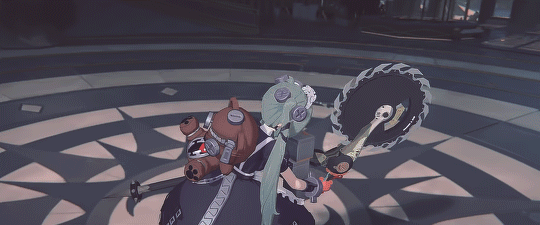
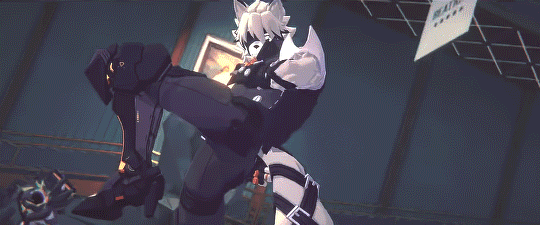
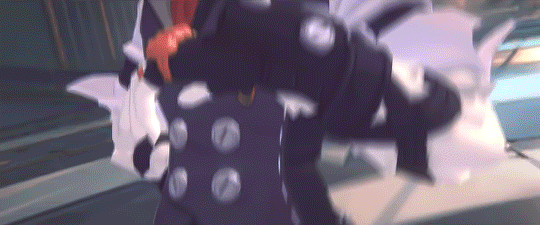
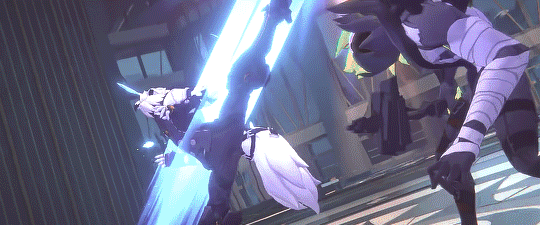
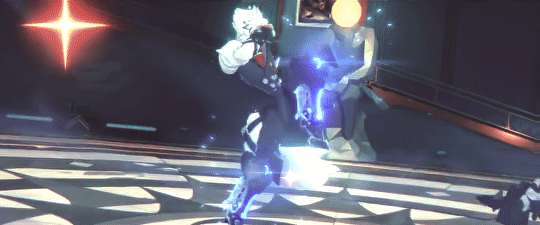

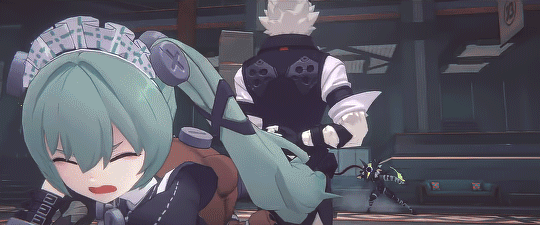

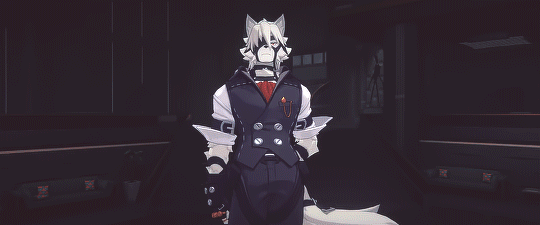
VICTORIA HOUSEKEEPING CO. ❖ VON LYCAON
We have obtained the item you requested. But, it seems this area requires further cleaning.
#zzz#zenless zone zero#von lycaon#lycaon#flashing tw#zzzedit#m:gifs#m:*#HOYO-MIX HAND OVER THIS DEMO MUSIC NOW!!!!!!!!!!!!!!!!!!!!!!!!!!!#zzz is already fucking so hard with the music i'm gonna pass out. in general zzz's style is just sooooo good it rly stands out#this demo was also so damn good!!!!!!!!!! like these animations HELLOOOOOOO they're really gonna make me fall for the butler wolf man. lord
196 notes
·
View notes
Text
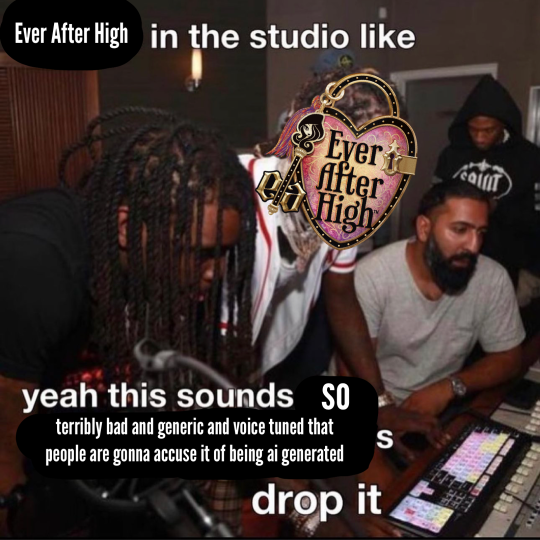
What is going onnnnn
#sid rants#ever after high#i genuinely don’t THINK it’s ai generated#be it the lyrics or the voices or the music#(destiny was really pushing it though)#because in the end their market is young girls who don’t need AMAZING music or complicated lyrics to enjoy it#but it still just sounds SO bad
293 notes
·
View notes
Text
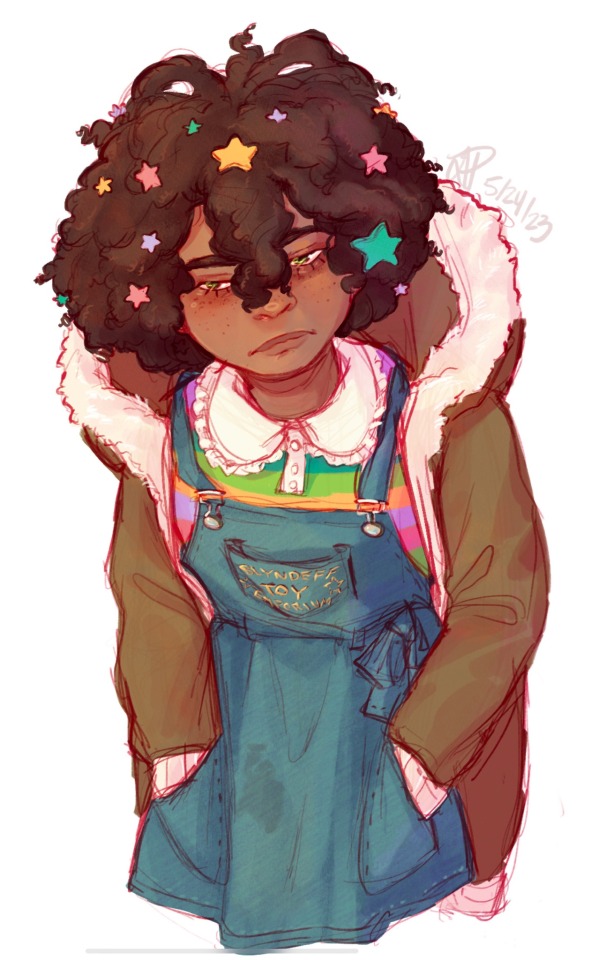
“it’s just a warmup sketch,” i say to myself. “i’m just gonna warm up on shading and coloring. i’m just warming up on anatomy.” my spine crackles from sitting in shrimp stance for 2 hours. “just to warm up.”
#dairydraws#epithet erased#molly blyndeff#prison of plastic#jelloapocalypse#epithet erased prison of plastic#eepop#digital painting#molly is really fun to practice drawing hair on but i do kinda feel like i’m fighting against the skin tone in her ref whenever i draw her#i don’t even necessarily feel like i favor warmer or more saturated tones in general but idk#something about the color in her ref doesn’t mesh right with my painting style#i should try painting her lit in cooler toned light that might help#i was drawing her crying and then changed my mind#but i forgot to erase the little snot bubble. so i guess molly has a runny nose#the reason i got so carried away is almost definitely because the cafe im in is playing such slow relaxing music#i usually listen to pretty upbeat stuff when i draw#and it motivates me to go fairly fast. but i was just kinda enjoying myself and going with the rhythm of the lowfi beatstrumentals#this is a great cafe. the masala chai here fucking shreds#it’s so cardamom heavy and baby do i love cardamom#you know a tea at a cafe is good if drinking the stuff leftover at the bottom gets a lil grit in ur mouth#molly deserves a warm cup of masala chai frankly
974 notes
·
View notes
Text

once again spreading my alonzostrap propaganda
#idk what inspired me to draw this#i just think munk would be really annoying when he and alonzo get together#munk never gets to be the annoying one. let him bother someone. as a treat#and who else is better than his boyfriend#alonzo is not filled with hatred for munkustrap he's just filled with hatred in general#idk if you guys can see my vision or not with this i just think munk deserves to be a little annoying sometimes#cats the musical#cats musical#munkustrap#alonzo#alonzo cats#alonzostrap#my art
119 notes
·
View notes
Text
I am genuinely so glad that the iwtv writers decided to age up not just Claudia, but the entire main vamp cast. Aging up Lestat, Louis and Armand to their late twenties to early thirties gives them more depth and dimension, both generally (in my experience, you experience, grow and develop so much in your twenties, even if it’s not necessarily as visible as the growth in your teens) and specifically for the individual characters (I have so many bullet points of thoughts in my notes app, I’m not even kidding).
Also, can you imagine how fucking insufferable Lestat would be about it if he had been turned before his singing voice had reached vocal maturity? He’d need an entire 600 page book to bitch about that exclusively
#iwtv#interview with the vampire#iwtv amc#your voice changes throughout your life but you generally reach ‘vocal maturity’ somewhere between 20-30#there’s an interesting thing where singers see their vocal range broaden strengthen and settle#not just because of practice (tho that’s obv important) but it’s physical as well#I’ve read and heard some really interesting interviews with opera singers in particular talking about the necessity of vocal maturity in#certain roles and that it’s not just that they physically need to be able to look the part but also sound the part#anyway I’m a big ol nerd who took high level music & drama in school#(so yes some of those bullet point thoughts are about commedia dell’arte i can’t help it)
94 notes
·
View notes
Text

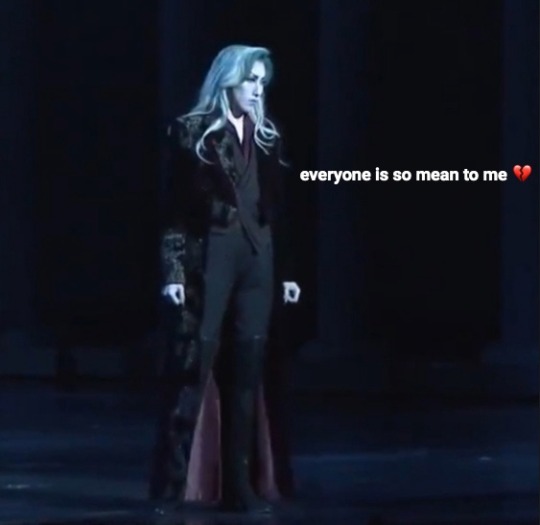

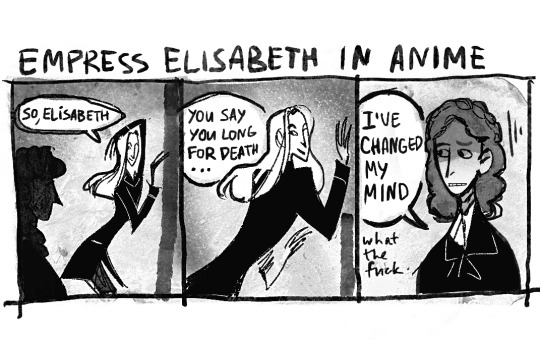
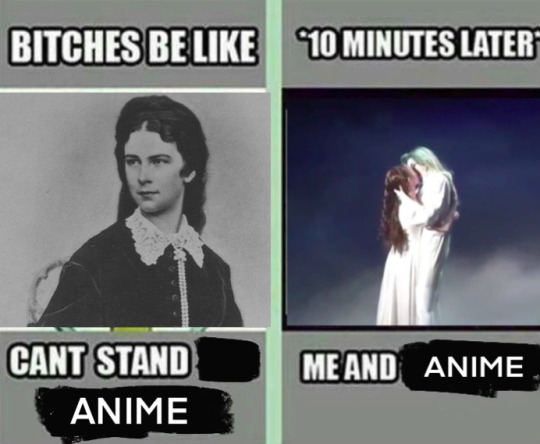

low quality takarazuka memes (i've posted some of them already but it was 150 years ago so.)
#my favourite part is that i don't really like takarazuka portrayal of elisabeth in general#so i always just kinda drew her like. just. normal elisabeth.#whos for some reason kissing with (my beloved) anime girl tod#so i was joking about this constantly#yep that's like the context i guess#elisabeth das musical#takarazuka
77 notes
·
View notes
Text
but fr outside of my contracted madness i absolutely refuse to give joe alwyn gold rush like how is that song at all related to their relationship the lyrics clearly spell out a relationship that either never existed or only existed in implication and fantasies and maybe-maybe nots and its so bitter and yet desperately soft in the bridge where it almost projects a sense of envy, of wanting to be them as much as you want them. It continues an interesting oft ignored lyrical trend of taylor wanting just as much to be her lover as to have them, envying their easy charisma (you were flush with the currency of cool/i was always turning out my pockets) or quiet dignity (your integrity makes me seem small) dating back to her earliest songs (the kind of flawless i wish i could be). Theres a projected self hatred and yearning to be better that twists itself into both romantic and sexual lust for her partners thats so fascinating and speaks to how all of her songs regardless of who theyre about are also an act of self reflection on who she is and who she wishes to be.
#barry.txt#taylor swift#putting this in the tags as a form of self protection but make no mistake this is a gay thing to do especially in gold rush#which through simple context clues is Obviously About A Woman or maybe even women in general#whivh is a totally seperate post on how taylor constructs and uses gender identity in her music#her girlhood and femininity are earnest but also so carefully constructed and so high effort and kind of desperate#shes a deeply self concious and obsessive person who never looks comfortable in anything ever unless shes#onstage or like. by herself in loose jeans and a tshirt#i think thats one of the things that subconsciously irritate ppl when it comes to her shes constantly and clearly putting in effort#to appear As The Celebrity Taylor Swift and struggles not to self censor or overperform in interviews (when she gives them)#especially present in pre 1989 interviews where the interviewers really didnt have to respect her or worry abt how they frame her#if they didnt want to. Like the fearless era rolling stone interview where she almost has a meltdown over her mom buying eggnog instead of#milk. That whole interview is strange looking back not just bc of the weird misogyny but also because of what it does share#taylor is....weird. She has a strange and desperate vibe and always reacts slightly too much and uses slang poorly#shes media trained and has learned how to socialize but you can feel her discomfort whenever she doesnt have a guitar in her hand#idk these tags have once again gotten so unweildy. i just find it interesting that she finally feels some level of comfortable#in sharing that construction w us in songs like mirrorball and mastermind and imo gold rush#and scene#should i write this up and put it in the swiftieism zine#i should write something and put it in the swiftieism zine
107 notes
·
View notes
Text
You know what's really tragic about the character of Rudolf in Elisabeth das Musical? (Besides, y'know... Everything?)
That he's a LOT like Franz Joseph too, at least when he was his age.
They're both under the thumb of one parent, who doesn't allow them to express their own political view. They both feel like intrigue is ruining their lives, and wish they weren't in the restricting position they occupy. And most importantly: they both express a desire to be "soft", instead of the hard and emotionless leader they're drilled to be.
Why then, is there no song, not a single line, where either of them acknowledge that similarity? Elisabeth and Rudolf both sing about how similar they are, why can't Rudolf and FJ?
Because Rudolf doesn't know. How could he know that his own father went through the exact same pressure he is under.. when the pressure was successful in molding him? He never sees that softer side to him.
Franz Joseph might have chosen Elisabeth over his mother in the end, but he internalized her lessons and sees them as truth. He is hard, he is strict, and he doesn't know any other way to be. He doesn't see anything wrong with how he's treating his son. (And in his childhood, how Sophie raised him). He turned out fine, why should Rudolf be different?
So Rudolf had not one, but two parents who should have been able to relate to at least part of his despair. But both failed to be the parent they wished they had. And I don't know if it's better or worse that he never even knew how his father was similar to him, too.
#I'm surprised I haven't seen much mention of this#Maybe this is a super common idea and I just haven't seen it. Or maybe it's too obvious to point out#But idk I just got sad when I connected the dots#They're even dressed the same#Poor Rudolf really got the worst cards from both his parents hands#Elisabeth#elisabeth das musical#kronprinz rudolf#Not to mention Rudolf Ich Bin Ausser Mir which uses the same melody as Bellaria and Ein Keizerin Muss Glantzen#And Unsere Keizerin Soll Sich Wegen.#All about the pressures of the court. Trying to make them conform.#Elisabeth in her fixation on her beauty (the most successful political tool she wields)#Elisabeth and FJ BOTH are pressured by Sophie specifically#And then FJ has an argument with his son. Which literally sounds similar to the argument he had with his mother.#Ofc Elisabeth reprises FJ's parts too when she rejects Rudolf's plea for help#Like he rejected hers. But that parallel is written in bright neon lights#I feel like FJ mirroring Sophie is less noticable but no less impactful#God. Circles never do stop themselves do they?#-slaps the Austrian emperial family- this bad boy can fit so much generational trauma in it
55 notes
·
View notes
Text
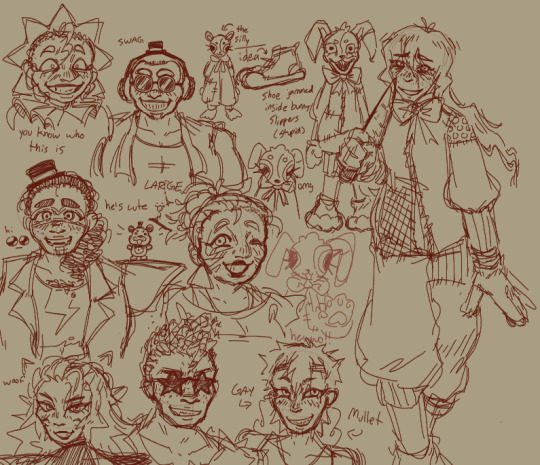
sb humanizations + various vannys :3
#my art#fnaf#security breach#five nights at freddy's#so can i tag everyone or would that just be annoying. oh well#glamrock freddy#glamrock chica#glamrock bonnie#roxanne wolf#montgomery gator#monty gator#djmm#dj music man#daycare attendant#sundrop#sunnydrop#vanny fnaf#vanny#vanessa sb#<- idk how to tag her HFJSGJKD#ANYWAYYYY i've been learning how to incorporate cheekbones into the faces i draw#bc i want to draw vanessa's face similarly to the proportions of the vanny mask (with the big cheeks and slim face)#but it's also just something i've been really wanting to do anyway.. i've even been referencing the way team f/rtress 2 stylizes the faces#of all the mercs and stuff. bc i used to be obsessed with that game but i could never actually draw the characters properly#and it's been sooo SO helpful for me. its like a night and day transition for my art it's craaazy#anyway as for the other designs here.... these are all completely improvised Except for sun bc i've drawn this human sun before and i have#a general idea of what i want. but for the others idk if i'll draw them this exact way again in the future lmao. but i think they're still#pretty good for what they are !!!!#anyway i will stop rambling now HFKAJFKSG bye
123 notes
·
View notes
Text
ok ok, i know this isnt a wicked blog but its time for me to say my thoughts on the Wicked movie trailer.
I'm not stoked. I'm not much of a musical version lover already, but two things really rubbed me wrong, and I believe they apply to the musical as much as the book in their importance within the Themes.
Elphaba being played by Erivo and being black is cool. Erivo is a great singer, and her hair looks sick, and Elphie's hair is important. However, that casting choice being combined with a white Fiyero (who is Not White in the book, and very much experiences colonialist racism) and with no prosthetic effort to make Elphaba Not Beautiful (which is a Significant Element of Her Experience And Character), spoils any truly transgressive or progressive bite to that casting decision.
The only of the core mains thats not white is the character that is green. Interesting. The character who is extremely belittled for her appearance because she has a deformity, and because she's unattractive by conventional standards (esp because of her hawkish nose and strong chin), is a beautiful woman. Interesting!
Something about this just rubs me wrong. I think the musical has always made me skeptical in this area because its core adaption decisions were always bent toward stripping Wicked of much of its commentary on racism. In the book Fiyero is Vinkan, clearly coded Native American, and Winkie is a slur. They made the slur the name for the Vinkans in the musical. If I recall correctly, Quadlings aren't even mentioned in the musical. But Fiyero in the musical... I don't even know Why they keep him being a foriegn prince because he isnt written like hes foriegn from Gillikin at all. His ethnicity seems totally flattened, a slur that indicates no cultural or experiencial distinction from Gillikin.
I think that may have happened because Animals were already considered an allegory for racism, and they wanted to make that allegory cleaner and easier to condense into a musical plot. Thats my theory. However, that is a misreading. The Animals are not a perfectly singular allegory, and I think you could argue several inspirations, but the most apt interpretation for sure is that the Animals are an allegory for people with disabilities and neurodivergence, as Elphaba's experience is.
The Animals are not merely culturally different or isolated. They are not falsely believed to be different from the Gillikins or the Munchkinlanders or Vinkans. They ARE different, not because they aren't people but because their basic needs are different, and are not adapted to by society. They have hooves, and different skeletons, and different senses, and different mouths that can't necessarily make the kind of speech humans use.
This is important because Elphaba uniquely relates to the Animals, and its because Elphaba has a deformity and is super autistic. This is the other thing that always rubbed me wrong about the musical: it always implied that the only thing that made Elphaba "ugly" to people was her green skin. Thats... weak shit!!! In the book, Elphaba is Not beautiful. She is hatchet faced. She is tall and androgynous and looks weird. And this is IMPORTANT, because it makes Elphaba a genuinely transgressive character!! Her experience is layered! She is green but also breaks gender rules, is awkward, is self hating, is rude, ect. ect. It strengthens her empathy she feels toward Animals, because she feels so othered from society that she feels non-human, alienated.
The book also handles Elphaba's attractiveness much better; it does a great job of depicting someone who is not beautiful but is nevertheless Hot, which Elphaba is. When Glinda looks at her for the first time and thinks that shes beautiful, she is not looking past Elphaba's skin and she does no make over. She puts Elphaba in an orange hat as a joke, and sees how it matches her skin and suits her, and it makes Glinda realise that the green of Elphaba's skin can be beautiful to her. And that changes how Glinda sees Elphaba; Elphaba does not change.
okay im just complaining about the musical now. But idk, I wish that they'd used this opportunity to do better by Fiyero, make the themes a bit better... and just... put some light prosthetics on Erivo. Just make her look a little uglier! A little more hatchety. Its not like it'd be out of place, Ariana Grande as Glinda looks spooky as fuck. Why does she look like that. I like it bc I like Glinda looking intense and spooky but it IS weird
#Wicked#Fiyero being white is always the most annoying thing with the musicals tho. Come on.#just musical fiyero in general. they really butchered u king
144 notes
·
View notes
Text
something to be said about how kristoph's only known mentee is a loud young man who dresses flashily, is particular about music and so passionate about the truth that he forgets to take people's feelings into account sometimes and follows the thread of logic even when it's disadvantageous to his case or people he cares about/admires. and who also does vocal training. like. just admit you miss your brother and go visit him. freak.
#to be clear this post is mostly a joke but i am serious about him being a freak and missing his brother.#sorry to all the pure evil kristoph enjoyers out there but i believe he loved his brother#kristoph gavin#klavier gavin#apollo justice#something so funny about the idea that kristoph looked at apollo & went 'omg... like klavier' in the same way that phoenix looked at ema#& went 'omg... just like maya fr' in rfta. the parallels are real to ME.#tangent but i feel like kristoph generally loves in the same way regardless of what type of love it is. i.e. buried beneath lots of self#justification about how it's not love and he's really tricking & using & manipulating them for his own means#17 y/o kristoph using his first pay check to buy klavier a guitar for christmas like 'yes... i will get him this instrument that is clearly#more COMMON & INFERIOR to my violin so he wont EMBARRASS me by being uncultured & not knowing anything about music... but he will ALWAYS#know he can't compare to me...'#vs 9 y/o klavier opening his present & being like 'wow! my older brother is so generous & cool <3 i love him so much <33#they're so funny to me actually
124 notes
·
View notes
Text
"Minkowski's been talking about Sondheim again…": Minkowski's love of musical theatre and what it reveals about her characterisation and her relationships
TL;DR: Renée Minkowski's love of musicals, while it might seem just like a mundane character detail, is used to give depth to her character because it contrasts with expectations of her from both the listening audience and the other characters. Her willingness or unwillingness to share this interest in different circumstances reveals her relationships with other characters at various points.
Since this is a long one, if you'd rather read it as a document, you can view it here: Google Doc version.
"She actually really cares about these talent shows": Episode 8 (Box 953)
In the early episodes of Season 1, Minkowski is presented (largely through Eiffel's unreliable perspective) purely as a strict no-nonsense authority figure without much emotional depth, the kind of person who only likes things that are useful, purposeful, or mandated by Command. In contrast, musical theatre is a creative pursuit that has nothing to do with the mission of the Hephaestus and is viewed by many people as fairly frivolous or silly. The gradual exploration of Minkowski's passion for musicals is one of the many ways that the show expands and challenges our understanding of her as a character.
The first indication that we get of her interest in musicals is through her entry into the infamous talent show, something that is required as part of the mission. Minkowski really cares about 'crew morale' activities in general, even when they actually have a negative effect on morale and even before she's friends with any of her crew (for example, the Christmas and Thanksgiving dinners in the earlier stage of the mission), perhaps partly because doing things in the "right way" is important to her.
But Eiffel senses that the talent shows aren't just about rules for her: "it’s bad enough when she makes us do something just because it’s military protocol, but I think that she actually really cares about these talent shows". This might be the first indication that we get of Minkowski caring deeply about anything that isn't inherently part of her role as a Commander. Moments like this are part of the gradual process of giving us insight into her character beyond the Commander archetype that she tries to embody. And yet, she only indulges her theatrical passion because something mandatory gives her permission, or an excuse, to let another part of herself out.
Of course, to satisfy the needs of a talent show, she'd only need to provide a performance of a few minutes. But Eiffel mentions "the second act of the play" - which along with Hera's comment that "Isabel isn't the biggest role in the play" - implies that Minkowski was intending to put on the whole of Pirates of Penzance as her talent show act, rather than a few of the songs or some kind of medley. (I suppose that Eiffel could be exaggerating or Minkowski might have been planning to do extracts from different parts of the play, but I prefer the interpretation in which Minkowski gets to be more ridiculous.)
Even though no one else would be willing to be in her production of Pirates of Penzance, Minkowski casts Hera as Isabel, a role with two lines and no solo singing. I found some audition notes for this play which said "The traditional staging gives [Isabel] more prominence than the solo opportunities of the part suggest, so she must be a good actress" which does make me sad in relation to Hera's inability to have a more significant role by being physically present on stage.
It’s sweet that Hera still wants to take part though. She tells Eiffel "Pirates of Penzance is a classic of 19th century comic opera", so either she’s absorbed what Minkowski has told her about the show, or she’s done her own research and formed her own opinions. I enjoy the fact that Hera is the one Hephaestus crew member who shows potential to share Minkowski's musical theatre appreciation; I like to think that this is something they could explore together post-canon.
Anyway, I'm obsessed with the idea that Minkowski was planning to play every character except one in Pirates of Penzance, a show which is designed to have 10 principal characters and a chorus of 14 men. It seems that her contribution to the talent show was supposed to be an entire two-hour two-act musical, with costumes and props, in which she would play almost all of the parts. This is very funny to me as the perhaps predictable consequence of giving an ambitious and frustrated grown-up theatre kid a position of authority and asking them to arrange a talent show. Minkowski knows that the audience will be made up of her subordinates who are theoretically obliged by the chain of command to watch and listen, so she absolutely tries to make the most of that opportunity. There's probably also a degree to which she limits other people's involvement in her musical because - as with her other endeavors - she wants the outcome to be almost entirely within her control (something that is usually pretty much impossible in as collaborative a medium as musical theatre).
Of course, Minkowski's behaviour in most of the talent show episode is affected by her being drugged by Hilbert. This creates an exaggerated situation which is the first real opportunity for Minkowski to be something other than the strict sensible authoritarian Commander and the foil to Eiffel's jokey laid-back attitude. I don't agree with ideas that being intoxicated brings out anyone's true self (especially in the absence of consent for the intoxication), but it seems pretty clear that being under the influence of whatever was in Hilbert's concoction caused Minkowski to fully commit to a level of manic enthusiasm for her musical production that might have otherwise been obscured by her professionalism. It's a particular kind of person who belts showtunes when drunk, and Minkowski is that kind of person, even if that's not how she wants to present herself. (As a sidenote, I seem to remember that they took Emma Sherr-Ziarko's script off her to help her sound more drunk. It's an excellent performance.)
Minkowski wants interval ice cream. She wants "pirate costumes" (and she'll threaten to shoot a man to get them). She wants "swashes and buckles". She wants whatever props she can get her hands on (including a real cannon). This show is important to her, even though only three other people will witness it and two of them actively don't want to be there. It’s important to her for its own sake.
Eiffel says Minkowski wants "a second pair of eyes to tell her if the prop sabre for her Major-General costume was a bit much…" While I certainly wouldn't put it past Goddard Futuristics to have a prop sabre on the station for no apparent reason, it feels more likely that she might have made it or adapted some existing item. Which suggests that maybe she was that passionate about the props even before Hilbert drugged her.
Even so, it does feel significant that Minkowski's love of musicals is only revealed in the episode in which she is drugged, exhibiting lowered inhibitions, exaggerated behaviour, and an "impaired euphoric effect". Her love of musical theatre is initially revealed through a professional structure that provides permission, and then further emphasised by a forced intoxication that exaggerates some impulses that perhaps she already had.
"Some hobbies other than making trains run on time": Episode 17 (Bach to the Future)
After Eiffel tells to find Minkowski to find something else to do while her work duties have quietened down, they have the following exchange:
EIFFEL: You must have some hobbies other than making trains run on time. Something to do with friends? Boyfriends?
MINKOWSKI: Of course I do, but, well, there aren't really a lot of opportunities for rock climbing or trail hiking in the immediate vicinity.
Even though this quote doesn't mention musicals, I've included it here for two reasons. Firstly, it's very funny to me that, even after the talent show debacle, Eiffel acts like he's never had any evidence of Minkowski's hobbies. She tried to perform a whole play almost single-handedly and it didn't occur to him that this might indicate an interest of hers outside of work. I think this reflects the fairly two-dimensional view that Eiffel has previously had of Minkowski, which her interest in musical theatre didn't fit into.
Secondly, it feels notable that Minkowski doesn't mention musical theatre here. She wants to show that she has non-work interests, but without undermining her own authoritative image. Her interest in rock climbing and trail hiking - while it may be genuine - fits with how she wants to be seen as a Commander. These are hobbies which portray her as physically capable, with a high degree of stamina and a willingness to adapt to perhaps less hospitable surroundings. Of course, Minkowski does have these traits and they serve her well on the Hephaestus. But there's not really anything particularly surprising about her expressing these interests. The surprise in this scene comes from the reveal that she has a husband, a character detail which - like her love of musicals - isn't something we'd necessarily expect from the archetype-based view of her we are initially presented with.
Her interest in rock climbing and trail hiking never come up again, because these details don't really deepen her characterisation (or at least, they aren't really used to deepen her characterisation beyond proving that she isn't entirely all-work-and-no-play). In contrast, Minkowski's love of musicals is brought up over and over because it shows another side of her that she struggles to reveal on the Hephaestus, and that allows more interesting things to be done with her characterisation.
"You wanted to write showtunes": Episode 35 (Need to Know)
Alongside the more high stakes discoveries prompted by the leak from Kepler's files, we also learn that Minkowski applied to - and was rejected from - the Tisch Graduate Musical Theater Writing Program.
Up until this point, we've only had evidence that Minkowski enjoys performing in musicals. But here we learn that Minkowski doesn't just love watching or performing in musicals - she wanted to write them too. This suggests a creative side to her that we never see her fully express.
The course
The Tisch Graduate Musical Theatre Writing Program claims to be the only course of its kind in the world and it accepts just 30 students each year. The current application process requires applicants to: upload play scripts or recordings of songs they've written; answer a large number of extended response questions about their creative process and views on musical theatre; write a 'statement of purpose' which has to talk about why they are applying and include 3 original ideas for musicals; provide a professional resume and a digital portfolio; complete an exercise of writing in response to a prompt; and undergo an interview. The process might have changed somewhat since Minkowski would have been applying (which, if it was soon after she finished college, might have been around the early 2000s) or it might be different in Wolf 359's alternate universe, but I think we can safely assume that applying to this course was a serious undertaking that required an intense amount of commitment and work.
Applying to a course like that isn't something you do half-heartedly or on a whim. You couldn't apply to this course if you hadn't done a fair amount of musical theatre writing already. (The course requires applicants to choose to apply as bookwriters, lyricists, or composers, but I'm not going to make a guess here as to which of these Minkowski went for.) The fact that Minkowski wanted to study this course suggests that she was seriously considering trying to make a career out of musical theatre writing. In Once In A Lifetime, she tells Cutter that commanding a space station has always been her dream job, but we've got evidence here that it wasn't her only dream job. There's something kind of funny and kind of sad about the idea that writing musicals was her back-up / fall-back career path. She does not like to make life easy for herself.
The revelation
This information is revealed against Minkowski's will. It's not something she wanted people to find out, and she isn't happy about them knowing:
JACOBI: "Dear Renée, thank you for your interest in the Tisch Graduate Musical Theater Writing Program..."
MINKOWSKI: Oh, come on!
JACOBI: (pressing on) "We are sorry to say, we will not be able to offer you a spot in this year's blah blah blah." Oh this is too good. You wanted to write showtunes?
MINKOWSKI: Number one? Shut up. Number two, why are my personal records on there?! [...] How is it in any way relevant?!
JACOBI: Oh, I think it's very relevant. I mean, if you're sending someone to pilot ships in deep space, you want to make sure that they can, you know... paint with all the colors of the wind.
Jacobi CRACKS UP - and, although to a lesser degree, so does Lovelace. Minkowski looks at her: really?
LOVELACE: Sorry, Minkowski. It's... it's a little funny.
MINKOWKSI: No, it isn't!
Minkowski seems defensive and embarrassed here. She obviously doesn't trust everyone there with this revelation (Jacobi, Maxwell, Lovelace, and Hera are all present). She considers this information to be "personal" and irrelevant and not even "a little funny". She's used to reactions like Jacobi's (and to a lesser extent Lovelace's); in Ep41 Memoria, she says "most people think it's hilarious that I like musicals" (see below for more thoughts about this quote). But the fact that these mocking reactions are expected doesn't mean that they don't bother her. She wants so badly to be taken seriously and, in this scene, her interest in musical theatre seems to be incompatible with that. Jacobi reacts the way that he does because of the idea that I've already expressed, that a passion for musical theatre does not fit with the serious authoritative image that Minkowski has often presented. It's not the typical hobby of a soldier, especially not a Commander.
To me, the way Lovelace laughs suggests that she might not have previously known about Minkowski's love of musicals, or at least perhaps not the full extent of it. At any rate, it's definitely news to Jacobi. And Minkowski clearly hasn't talked about it enough for it not to feel like a big reveal for her.
The rejection
It's notable that this reveal is not just that she wanted to write for the stage, but also that she failed to get into a course that might have helped her work towards that goal. This of course compounds Minkowski's discomfort at having this information revealed. Not only did she want to write showtunes, but she encountered rejection in her attempts to do so. This detail implies that perhaps it wasn't just the appeal of her spacefaring dream that stopped her going down a theatrical career path.
I'm about to move more into headcanon territory rather than just straightforward analysis, but I personally believe that, while Minkowski auditioned for a lot of musicals (particularly as a child / young person), she was never cast as the main role. She seems embarrassed about her interest in musical theatre in a way that (at least judging by people I've encountered) people who were always the lead in their school / college productions don't tend to be.
We don't have much evidence about her actual level of singing/acting ability, given that she is inebriated during the only time we hear her sing in the podcast. However, it resonates with other aspects of her characterisation to imagine that Minkowski was generally good enough to get an ensemble part but never quite good enough to be cast as a main part. I think she might see only ever being cast as part of the ensemble, and failing to get into the Tisch Musical Theatre Writing programme, as slightly more down-to-earth examples of the same pattern as her repeated rejections from NASA. She is desperate to prove herself. She is "someone who very much wants to matter. To do something important." When she casts herself as almost every part in Pirates of Penzance, she is finally taking the opportunity to be a main character, an opportunity which I imagine had been denied to her over and over in both a literal and metaphorical sense.
"It's just from a play I saw once": Episode 41 (Memoria)
The next scene I want to talk about is from a memory of Hera's, which took place on Day 57 of the Hephaestus mission and in which Minkowski appears to be talking about the Stephen Sondheim musical Sunday in the Park with George:
MINKOWSKI: Oh, it's just from a play I saw once. It doesn't matter. (BEAT) The guy who sings it is this famous French painter. And his entire life is kinda falling apart. But he can always turn what's happening around him into these beautiful paintings.
HERA: And?
MINKOWSKI: And... That's, I don't know. Reassuring, maybe? (BEAT) I don't know why I'm going on about this. You don't care.
HERA: I think it's interesting.
MINKOWSKI: Yeah? Most people think it's hilarious that I like musicals.
HERA: I don't see what's funny about it.
MINKOWSKI: Well, thank you Hera, but you're not exactly... you know.
HERA: I'm not... what?
There's a couple of different things I want to pick out from this exchange. Firstly, the line "Most people think it's hilarious that I like musicals" makes me sad. I don't think she's talking about people on the Hephaestus there. Judging by the quote I talked about from Bach to the Future, Eiffel definitely wouldn't have registered Minkowski's love of musicals at this stage, and I doubt Hilbert cares at all about the hobbies of his fellow crew members. So Minkowski is talking about experiences that she's had on Earth, of people mocking her interest in musicals and thinking it doesn't fit with who she is. You can hear the impact of those experiences in Minkowski's reluctance to elaborate, in the way she says that something she obviously cares about doesn't matter, in her assumption that Hera doesn't care.
Secondly, this scene is a complicated one for Minkowski and Hera's relationship. On the one hand, Minkowski freely talks to Hera about something she's passionate about, and Hera listens and expresses interest. Hera validates Minkowski's interest in musical theatre without making a thing of it being weird and Minkowski thanks her. Again, it’s shown as an interest they could could potentially share.
But on the other hand, it seems like part of the reason Minkowski feels able to open up to Hera is because at this point Minkowski doesn't see opening up to Hera as fully equivalent to opening up to a fellow human. She doesn't just accept Hera not making fun of her interest; instead it seems Minkowski is about to imply that this lack of judgment indicates Hera's difference from humans (although she does have the decency not to say it outright). Minkowski's expectation of judgment from others contributes to her saying something very hurtful to Hera here. (This kind of potential consequence of negative self-attitude is explored a lot with Eiffel, so it's interesting that Minkowski can sometimes have a similar issue.)
Minkowski and Hera's conversation is interrupted when:
The DOOR OPENS.
EIFFEL: Hey, Minkowski, we've - What are you guys talking about?
MINKOWSKI: We were just discussing how I'm going to take away your hot water privileges if you don't reset the long-range scan.
Eiffel can obviously tell that he's walked in on a conversation that is about something other than work, or he wouldn't have asked. But Minkowski actively chooses not to tell him that she was talking to Hera about musicals. Perhaps she doesn't know how to open up to a human subordinate about it. Perhaps she doesn't trust him not to make fun of her. Perhaps she just doesn't have any impulse to talk about her interests with him. Either way, if Minkowski's love of musicals is something which reflects a side of her personality outside of her Commander role, this is a moment where she chooses not to take an opportunity to share that side of herself with Eiffel. This reflects the emotional distance between them three months into the mission, which forms a nice contrast with the next couple of quotes I'm going to talk about.
"Composition. Balance. Harmony.": Episode 54 (The Watchtower)
When Eiffel comes directly face to face with alien life, he discovers that music is the human invention that fascinates the Dear Listeners:
EIFFEL: You haven't figured out music?
BOB: ORDER. DESIGN. TENSION. COMPOSITION. BALANCE. HARMONY.
EIFFEL: (low, to himself) Minkowski's been talking about Sondheim again…
I only learned in the course of writing this post that in this moment the Dear Listeners are almost exactly quoting a repeated phrase used throughout Sunday in the Park with George. The titular protagonist lists various combinations of these qualities in multiple songs in reference to his art. In the closing song, the lyrics are "Order. Design. Tension. Composition. Balance. Light. [...] Harmony." It's not only Eiffel's references that the Dear Listeners are incorporating into their speech - they've picked this one up from Minkowski. This also suggests that some element of her appreciation for musicals and the way she talks about them has fed into the Dear Listeners' understanding of the human phenomenon of music. The Dear Listeners aren't just parroting - they understood the quote enough that they left out the word "light", arguably the only quality in that phrase which isn't a big part of music as well as visual art. Eiffel likes music too, but I don't think that this is how he'd talk about his favourite songs.
This is a refrain about finding order and beauty out of the chaos and uncertainty of life, which was also the aspect of Sunday in the Park with George that Minkowski focused on when talking about it in Memoria. It suggests that art/music could be something governed by rules and principles, which is potentially something that appeals both to Minkowski and to the Dear Listeners.
Eiffel's response to this reference is one of those little hints that reminds us that Eiffel and Minkowski have spent a lot of time together and that not all of that time has involved them being at each others' throats or actively in a life-or-death situation. Some of it has just been Minkowski going on about a musical she loves and Eiffel (willingly or not) paying enough attention that he recognises this phrase as a Sondheim quote that Minkowski has talked about. I suppose that this quote might have been in Eiffel's pop-culture-brain anyway, but judging from Eiffel's general tastes and the fact that I don't think Sunday in the Park with George is one of the more commonly known Sondheim musicals among non-musical fans, it seems more likely that this quote is something he only knows because Minkowski has talked about it.
Eiffel sounds exasperated at the mention, like he's heard Minkowski talk about Sondheim far too much. But I'd argue that this still says something positive about their relationship, when we contrast it with a couple of other moments I've already mentioned. Firstly, when her previous musical theatre ambitions are revealed to Jacobi, Maxwell, and Lovelace in Need to Know, Minkowski seems embarrassed and defensive. Secondly, in the memory from Memoria, she avoids telling Eiffel that she was talking about this same musical. Yet, by the time The Watchtower takes place, Eiffel is sick of hearing Minkowski talk about Sondheim. She doesn't have the same barriers up in sharing her interests with him, even though he doesn't have the same interests. I think this is a demonstration of how comfortable she feels with him. It's a hint at the kind of easy downtime that they've sometimes shared.
"One day more": Episode 61 (Brave New World)
Eiffel recognises another musical reference of Minkowski’s in the finale. As the crew are preparing for their final confrontation with Cutter and co., Minkowski quotes Les Misérables, mostly to herself - but Eiffel recognises the lyrics and joins in:
EIFFEL: Hey - chin up, soldier. We're almost through. Just one more day, and then we're done.
MINKOWSKI: Yeah, one more day. (more to herself) The time is now, the place is here - one day more.
EIFFEL: - one day more.
They both stop, dead in their tracks.
MINKOWSKI: Did you just - ?
EIFFEL: Was that what I - ?
They look at each other: No way. And BURST INTO LAUGHTER.
EIFFEL: Man... this is really it, huh? The end of everything.
It feels really important that Minkowski and Eiffel share this moment of togetherness before she tries to send him back to Earth and before the rest of the action goes down. I think there’s some nice symbolism about them finding a way to communicate that they both understand. Making references is Eiffel's thing, and musicals are Minkowski's thing, so this is a synthesis of their two approaches. Again, there's a contrast with Minkowski's previous unwillingness to share her musical theatre passions with Eiffel (at least without the mitigating circumstances of a mandatory talent show and some kind of intoxicating substance).
I talked about the significance of the fact that they reference this particular musical in this post from ages ago. I don't think it's too much of a spoiler for Les Misérables to say that the revolution that the song One Day More is building up to does not end well for the revolutionaries. When Eiffel says "Just one more day, and then we're done", it encompasses both the possibility that the crew will escape to travel back to Earth and the possibility that they will all die. Minkowski's reference to a famously tragic musical suggests that it's the latter possibility that's at the forefront of her mind (right before she tries to send Eiffel away from the danger). But Les Misérables is also a story about people standing together in solidarity against powerful oppressive forces, which gives particular resonance to the way that this reference brings Eiffel and Minkowski together in a moment of being completely on the same wavelength as they prepare to fight Cutter and Pryce's plan.
When they laugh here, it's not about the 'hilariousness' of Minkowski's interest in musicals, it's about their unexpected unison - Eiffel's recognition of Minkowski's reference and Minkowski's surprise at the fact he joined in. It's a laugh of togetherness, of shared understanding, of friendship. It's a moment of lightness in dark times. And that moment is provided by Minkowski's pop culture interests, not Eiffel's. In spite of all they've been through, she's not lost that part of herself, and in fact, she's more open about it, at least to Eiffel.
I'll finish by highlighting what Eiffel says when he's trying to get into character to impersonate Minkowski so he can turn the Sol around:
EIFFEL: Umm... yes, this is Lieutenant Commander Renée Minkowski. I'm... uh... well I sure love schedules, and, uh, musicals. And that man, who I married…
I just think this is a nice example of Eiffel not defining Minkowski solely by her professional Commander role. Sure, she likes schedules (probably in a personal as well a professional capacity to be fair), but she also loves musicals, and her husband. It is a fairly reductive overview of her as a person, but it feels reductive in a fond way, like these things are part of Minkowski's brand to Eiffel in a way that he might affectionately tease her about. (Credit to @commsroom for this thought.) His view of Minkowski has come a long way from "our resident Statsi agent" or even just "you must have some hobbies other than making trains run on time." He doesn't see any contradiction or inherent humour in Lieutenant Commander Renée Minkowski's appreciation of musicals.
Conclusion
Minkowski's love of musical theatre is used to deepen her characterisation and is one of the ways in which we gradually begin to see her complexity beyond the strict Commander archetype. The degree to which she is prepared to share this interest at various points is used to illustrate the nature of her relationships with other characters: a general unwillingness to show a less serious side of herself; a complicated potential shared interest with Hera; and the growing understanding between her and Eiffel.
If you read this whole thing, well done / thank you 😄 It wasn't meant to be this long - it just happened… Feel free to share your thoughts!
#It's Minkowski Essay Time again!#This is over 4700 words and still doesn't cover it all...#I hadn't quite realised there was so much to say!#Wolf 359#w359#If anyone is more familiar with 'Sunday in the Park with George' and has thoughts on why it might particularly appeal to Minkowski#I'd be interested to hear#I listened to the soundtrack and read the Wikipedia plot summary#but I don't think I really got it#My other significant bit of research was that#in order to see what applying to the Tisch Graduate Musical Theatre Writing Program involves#I had to create an account as if I was actually applying#which might be the oddest thing I've done for character analysis#If it interests anyone I could do a post with more detail about that application process#cos it looks insanely intense#Renée Minkowski#Renee Minkowski#the empty man posteth#I hope no one takes things I have said here as critical of musical theatre people btw#I'm just talking about general perceptions#In general I do enjoy musicals myself from an audience perspective
202 notes
·
View notes
Text
absolutely wild to me that apparently some people today only got to know fast car because it was remade recently by a white country singer when that song has been a quadruple platinum hit in my household since i was born
#like whew i'm glad my mom and my older cousins have great taste in music#but i also love that a new generation gets to be introduced to this song again because#it really is just a great song#tracy chapman#you will always be famous
57 notes
·
View notes
Text

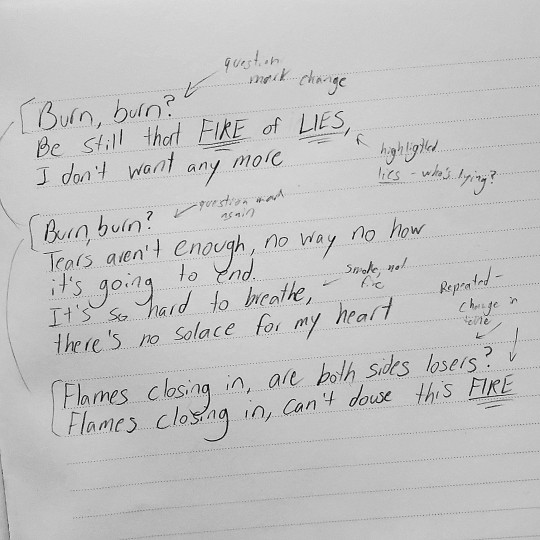
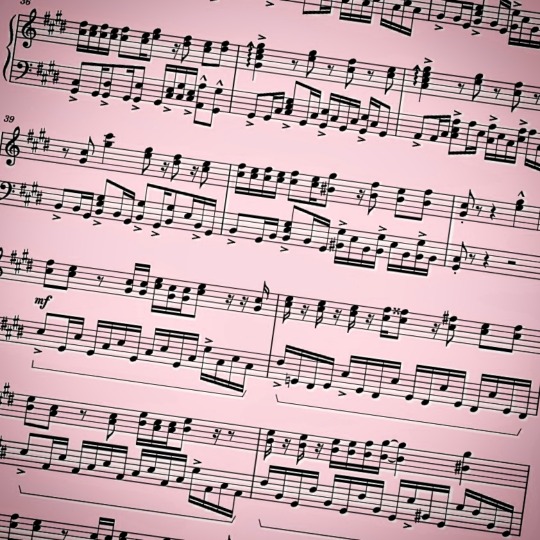
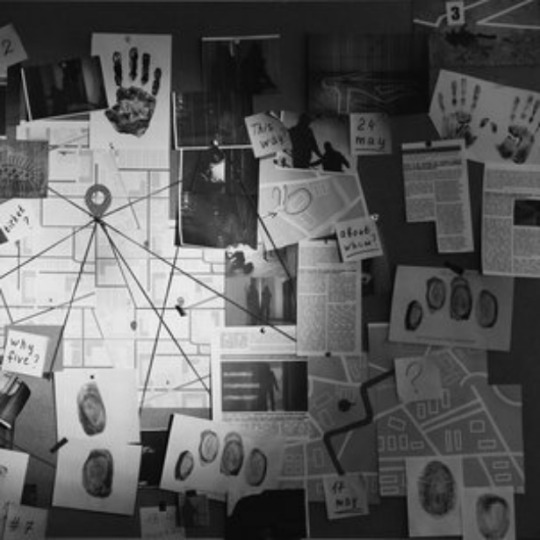

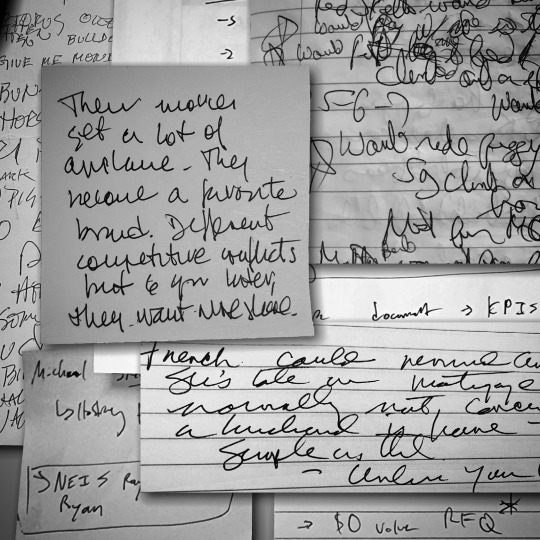
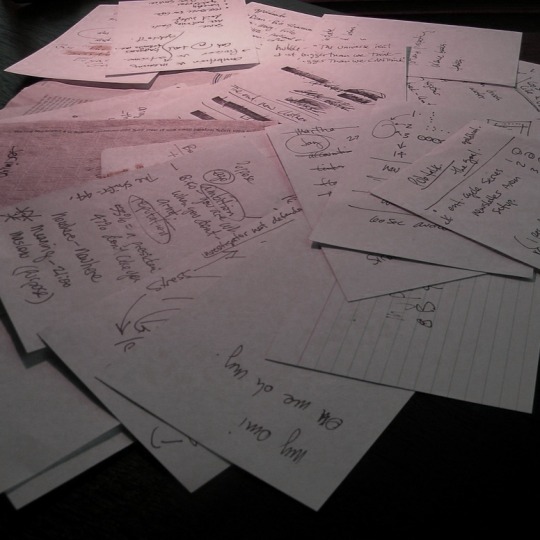
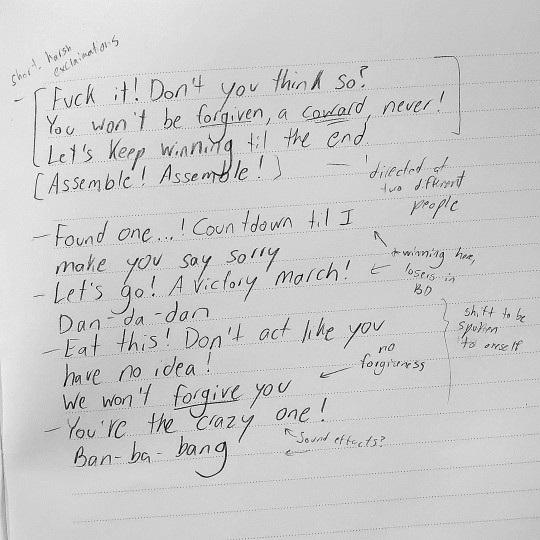

I really liked that the Jailbreak mix showed the mvs on an old TV. Sleek, advanced tech is usually associated with such breaches of privacy, so it was cool to imagine prying into someone's worst memories/thoughts using low-tech methods...
I wrote the lyrics out, made the gifs myself, and edited pics from here: X X X X X
#milgram#fuuta kajiyama#the music sheet is bring it on!#and im really proud of the gifs!! :D#ive never made a gif with multiple layers/filters and things and it took me a while to figure out#so im excited >:3#i made this one for indulgent oc reasons but i mean it applies to the audience in general#how do your (mv-watching) ocs handle the huge imbalance of privacy?#its a very juicy concept to me...#i may swap out just the gifs/color schemes to make ones for other characters but im not making any promises lol#doing my quick notes for those lyrics made me want to really deep dive into lyric annotation one day 👀#rose posts
56 notes
·
View notes
Note
Oh my God you don't know popular music? Should we throw a party? Do you want a cookie?
this is the i love being pretentious about music blog thats not the most annoying shit ive said
#also. not really a dig at popular music i should be more broad with my tastes anyway i just think its funny occasionally#how hard i can fixate on things while not looking at the big picture#i have my criticisms but generally things are popular for a reason i just am a bit out of the loop pop culture wise
25 notes
·
View notes